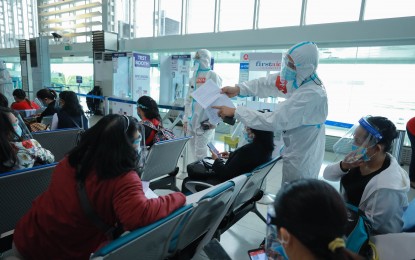
NEW PROTOCOL. Starting Feb. 1, arriving passengers, regardless of their origin, will be required to undergo facility-based quarantine upon arrival. They will undergo RT-PCR test on the fifth day from their date of arrival in the country unless the passenger shows symptoms at an earlier date while on quarantine, according to Presidential Spokesperson Harry Roque. (Presidential Photo)
MANILA – The national government will be requiring travelers entering the Philippines to undergo reverse transcription-polymerase chain reaction (RT-PCR) testing five days after their arrival in the country starting Feb. 1, Malacañang said Wednesday.
Presidential Spokesperson Harry Roque said this new testing protocol was adopted by the Inter-Agency Task Force for the Management of Emerging Infectious Diseases (IATF-EID) last Tuesday.
“Arriving passengers, regardless of their origin, will be required to undergo facility-based quarantine upon arrival. They will then undergo RT-PCR test on the fifth day from their date of arrival in the country unless the passenger shows symptoms at an earlier date while on quarantine,” Roque said in a statement.
Once a passenger tested negative, he will be endorsed to the local government unit (LGU) of destination where he will continue the remainder of the 14-day quarantine.
Appropriate patient management will be observed as outlined in the guidelines of the Philippine Society for Microbiology and Infectious Diseases and the Department of Health Omnibus Guidelines on Prevention, Detection, Isolation, Treatment and Reintegration Strategies for Covid-19.
In compliance with the directive of President Rodrigo Duterte, he said the IATF also postponed the relaxation of the age-based restrictions in areas under the modified general community quarantine (MGCQ).
Last Monday, Duterte, in a taped speech, said he wanted children aged 10-14-years-old to stay inside their homes despite the easing of age restrictions recently approved by the IATF-EID.
He explained that he was particularly concerned about reports that the new Covid-19 variant spreads more easily in children.
Timely distribution
To ensure the accurate, timely, and efficient distribution and administration of the Covid-19 vaccines, the IATF authorized the Department of Information and Communications Technology (DICT) to perform actions necessary to procure the services of a qualified third-party service provider to cater to all services pertaining to the design approval, IT project implementation, and service management of the Philippine Covid-19 Vaccine Information Management System (VIMS).
The DICT will be tasked to formulate the standards to ascertain the qualifications of the third-party service provider in undertaking the required services in the VIMS.
The functions of the Philippine Covid-19 VIMS will include Citizen Vaccination Capture and Automation; Provide Management and Automation; Supply Chain Management; and VIMS Dashboarding, Reporting, and Analytics.
The Philippines aims to secure 148 million doses of Covid-19 vaccines from several companies to inoculate an initial 50 to 70 million Filipinos this year, with the first doses of China’s Sinovac expected to arrive by February. (PNA)
